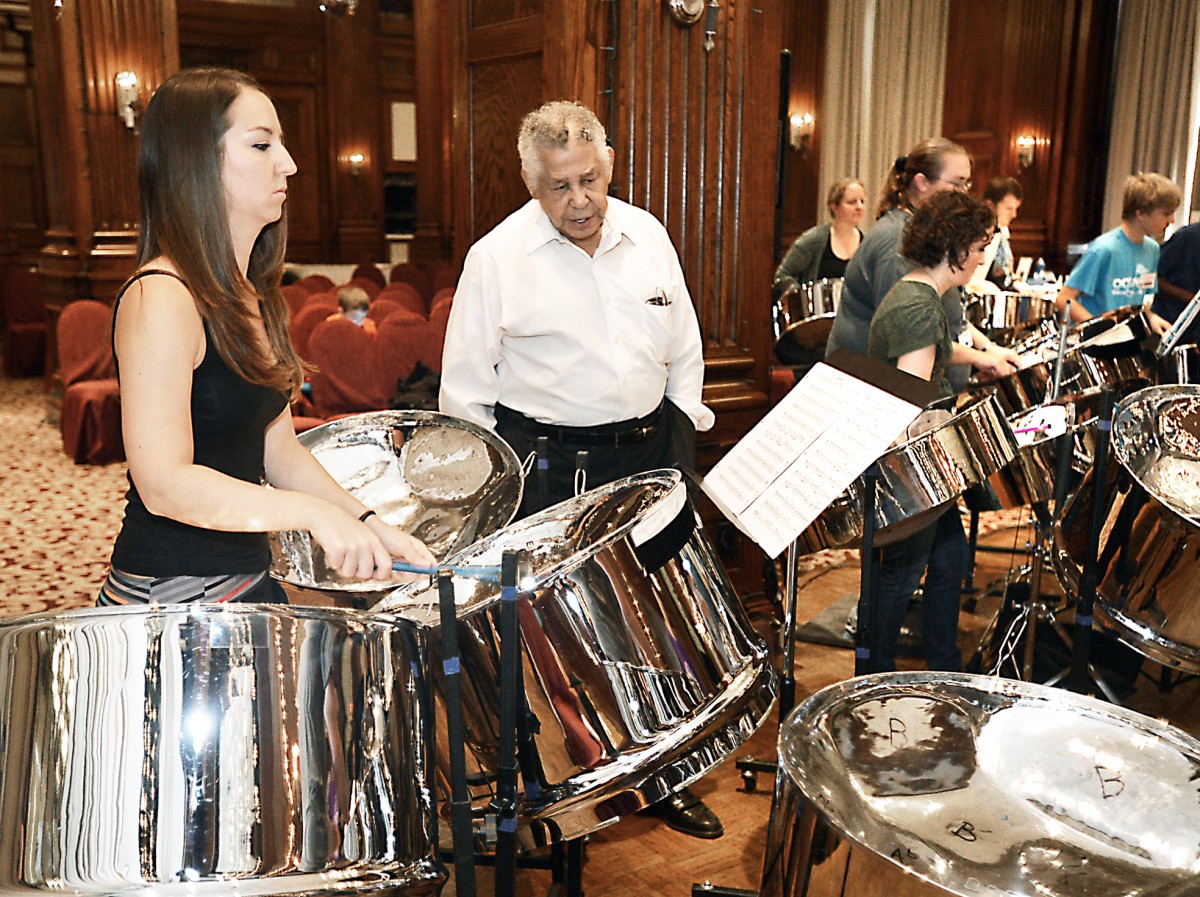MORGANTOWN — Like the lilting sounds of the steel drums he created, tributes continued to waft in to Morgantown on Thursday from across the world for Ellie Mannette.
The percussion pioneer died the day before at J.W. Ruby Hospital after months of declining health, his students and fans said. His funeral arrangements are pending.
Mannette, 90, was born Elliot Mannette on Nov. 5, 1927, in San Souci, Trinidad.
He was a precocious kid, in terms of percussion. If you pounded on it, and it made a noise in response, he was fascinated.
Trash cans and metal biscuit tins gave way to discarded 55-gallon oil drums, which were the castoffs of World War II and the loading docks of a Shell Oil plant in Trinidad.
By hammering indentations into concave metal surfaces, he found he could make different tones.
He could make a symphony in steel.
He could also, as he told The Dominion Post in 2001 with a rueful chuckle, make one big enemy: His father.
The elder Mannette’s anger and disdain drummed even louder after his son turned down a scholarship to a prestigious school in England.
“He said, ‘Why do you want to stay home and pound on trash cans?’ ” Ellie Mannette told the newspaper.
Because he could do a sonic-something that no one else in the world could: He could make all that industrial detritus dance with sonorous melodies by simply, as said, hammering the metal one way or the other.
Mannette made his first drum in 1946, and less than 20 years later, the sound defined his island home.
Thumping the tub
The irony was while he was initially lambasted by critics at home, he was also accused of culturally snubbing Trinidad when he left for the United States in 1967.
In reality, he was his country’s chief cultural export. He developed the U.S. Navy Steel Band and brought the lilting tropical rhythms of the steel drum to gritty, inner-city New York.
Which led to another musical sojourn in ano-ther decidedly non-tropical place: West Virginia.
WVU’s renowned percussionist and musicologist Phil Faini, recruited Mannette to WVU as a visiting professor in 1992.
Faini immediately dubbed the drummer “The Stradivarius of Steel.” And Mannette found a home in the mountains.
With the help of WVU and others, he founded a company to make his drums here: Mannette Musical Instruments, in the community of Osage, a melting pot unto itself as the home to whites, blacks and Middle Europeans who came here to work in the coal mines in the early 1900s.
Mike Kelly, a local businessman who was Mannette’s partner in the enterprise with WVU dean and former Morgantown mayor Ron Justice, said Thursday they plan to keep the company open.
“It’s always been about Ellie’s legacy,” Kelly said. “If you’re at Myrtle Beach, or on a cruise, and there’s a steel band playing, those are probably Mannette drums you’re hearing.”
Keeping time
“Everything I am is because of Ellie Mannette,” said Chanler Bailey, a local percussionist who studied with Mannette. He learned how to play steel drums and how to build them, from his mentor.
Today, he gives lessons and performances through cbStudios, which he owns and operates in the Morgantown area.
“Ellie taught me about professionalism and how you should never be satisfied — because you can always do better.
When Ellie was performing and teaching, he was just ‘in the moment.’ It was total commitment.”
In turn, Mannette was gratified by the commitment to his craft from the least tropical of places.
“Fifty years from now, people will look at those drums and say, ‘How’d they do that?’ ” he told The Dominion Post previously.
“We’ll know that they were done here in West Virginia by these young folks, who will pass the craft on to other young folks.”




